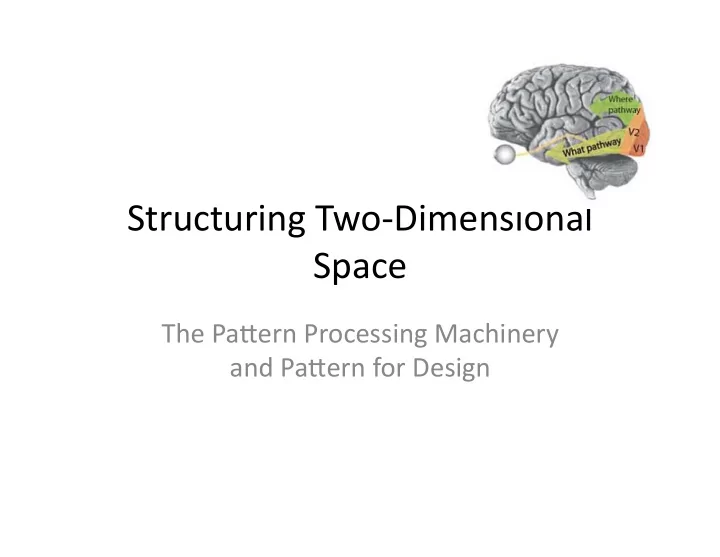

Structuring Two-Dimensional Space The Pa7ern Processing Machinery and Pa7ern for Design
2.5D Space • We live in a 3D world, but can we see 3D effecEvely? – Up-down, sideways, and away dimensions • InformaEon at only one point along each away direcEon is available, and has to be indirectly inferred – So we actually only see 2.5D, or 2.05D according to Ware
2.5D Space • We can sample up-down and sideways dimensions very rapidly (1/10 second), but to get new informaEon in depth, we have to move our head – Image space sampling is 100 Emes faster than depth sampling • The pa7ern-processing resources in the brain are mostly devoted to informaEon in image plane, not depth • Pa7erns: – The precursors of objects – Reveal relaEonships between objects
Pa7erns
The Pa7ern-Processing Machinery • The What pathway: – V1 -> V2 -> V4 -> Infero-temporal cortex (IT) -> Lateral Occipital Cortex (LOC) – Task-driven signals are also sent back from prefrontal cortex to help region finding
Features to Contours • Millions of fragmented pieces of informaEon in V1 need to be put together to form contours – Binding: combining different features that are parts of the same contour or region
Features to Contours • Millions of fragmented pieces of informaEon in V1 need to be put together to form contours – Binding: combining different features that are parts of the same contour or region
Generalized Contour • Objects can be separated from its surrounding in many different ways • A generalized contour extracEon mechanism is needed (occurring in LOC with input from V2 V3)
Texture Regions • The edges of objects can be defined by textures too
Texture Regions • The edges of objects can be defined by textures too Harder to disEnguish
Interference • One should maximize the feature-level difference
A7enEon and Pa7erns • Only features (colors, orientaEon, size, moEon, etc) can be pre-a7enEve • Pa7erns with different features can also pop out
Pa7ern Finding Hierarchy • Pa7erns are found in the what pathway, v1, v2, v3, v4, TI, etc in an increasingly complex way • It becomes harder to localize where in the brain the high level pa7erns are detected
Pa7ern Learning • The ability to discern low level and simple features and pa7erns is pre7y much universal • More complex pa7erns can be learned by individuals, taking place in V4 • Pa7ern detecEon is mostly done sequenEally, with very li7le pop out effect
Pa7erns formed by Groups of Objects • Pa7erns can be formed based on proximity • Pa7ern detecEon works on many different scales
MulE-scale, DistorEon, and Preference
Pa7ern For Design • Pa7erns can be used to establish relaEonships between components and make a design visually efficient • Pa7erns can be used to express the structure of ideas
Example of Pa7ern Queries
Example of Pa7ern Queries
SemanEc Pa7ern Mappings
SemanEc Pa7ern Mappings
Reference • Visual Thinking for Design by Colin Ware
Recommend
More recommend